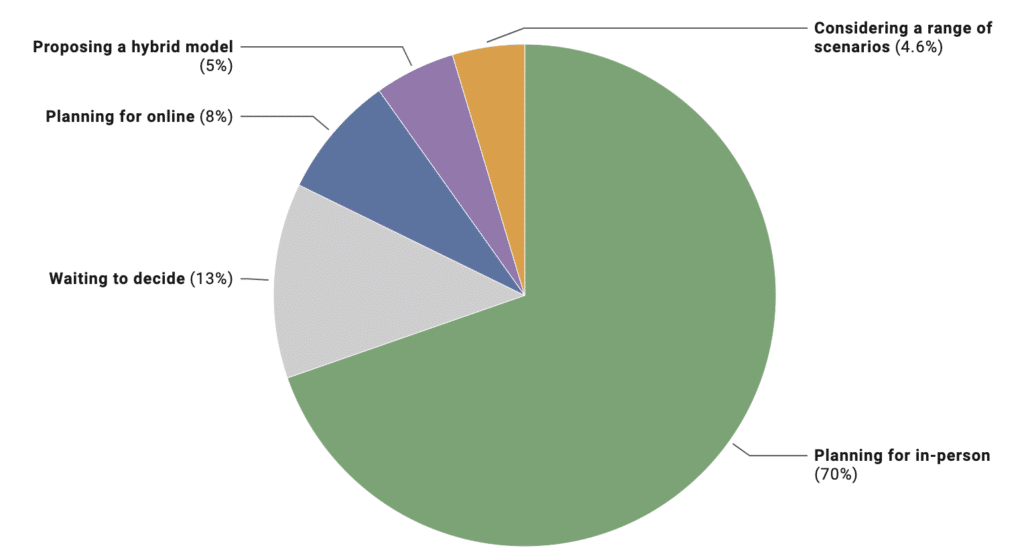Plans for return to campus still in flux
- Universities in major study destinations are adopting different approaches with some planning for in-person instruction and others already committing to stay with online delivery to start the new academic year
- The choice will factor heavily in student decision making for this fall, with the risk that more students may defer their admissions to 2021 if required to continue studies online in the second half of this year
In a running tally conducted by the Chronicle of Higher Education, seven in ten US colleges say that they are planning to reopen their campuses for in-person instruction for the academic year starting in September. The balance are planning for online delivery, or some combination of online and in-person teaching, or are still forming their plans.

The scale of opinion on the on-campus-or-online question tilted somewhat yesterday when the California State University System – with its 23 campuses – announced that it would delivery most of its classes online this fall. “Our university, when open without restrictions and fully in person, as is the traditional norm of the past, is a place where over 500,000 people come together in close and vibrant proximity with each other on a daily basis,” said Chancellor Timothy White. “That approach, sadly, just isn’t in the cards now.”
The California State universities, observed a related item in Forbes, “Is the nation’s largest four-year public university system. Its decision to remain closed is likely to influence other schools.”
The situation is similar in Canada where institutions have offered a range of response, with some planning for students to return to campus and others already deciding to stick with online delivery for the start of the academic year.
A number of universities, including the University of Saskatchewan, Université de Montréal, and Memorial University have already said that they will rely primarily on online delivery for fall classes. Other major research universities – notably McGill University, the University of British Columbia, and the University of Victoria – have also said that the bulk of their classes will be online to start the new academic year. Speaking to The Globe and Mail, McGill University Principal Suzanne Fortier said that, “With a little more than two weeks to the deadline for students to confirm their places for September, she felt the university should be clear about what to expect.”
Manchester University is the first major British institution, and the first Russell Group member, to announce that its classes will remain online this fall. “Others are likely to follow suit,” says The Telegraph, “since social distancing measures are likely to stay in place for the foreseeable future.”
The situation is similar in many other destinations. Even in Australia and New Zealand, where early planning is underway to reopen borders for international students in the coming months, there is no clear timeline for when students will return to campus.
The question factors heavily in student decision making for the coming academic year and – in simple terms – part of the calculus here for university executives is whether a decision to stay with online delivery in the second half of this year will encourage greater numbers of students to defer their admissions to 2021. And of course this has to weighed in turn against the risks of COVID-19 exposure on campus, or the disruption of starting the semester on campus and having to shift to online mid-stream if a further outbreak should occur.
The situation will remain fluid for some time as governments, public health officials, and educators all continue to monitor the progress of the pandemic in the coming months. For now, these leaves most institutions engaged in intensive preparations for the new academic year, and still working with a number of possible scenarios for programme delivery.
For additional background, please see:
















